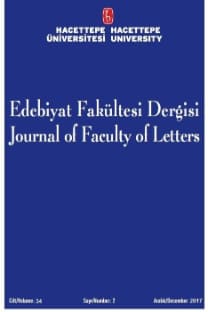Postcolonial Accommodations: Hospitality and Performance in The Tropical Breeze Hotel and Pantomime
Bu makale performans ve misafirperverlik olguları arasındaki ilişkiyi bir çerçeve olarak kullanarak iki Karayipli oyun yazarının çalışmalarında sömürgecilik sonrası toplumsal dinamiklerin rolünü incelemeyi hedefler. Guadeloupe'lu Maryse Condé'nin Pension les Alizés (Tropikal Esintiler Oteli) ve St. Lucia'lı Derek Walcott'ın Pantomime (Pandomim) isimli oyunlarında misafirperverlik olgusu, ve daha geniş anlamda bireyin kendisinin olarak algıladığı bir mekanda başkalarına yer temin etmesi ve onlara uyum sağlama süreçleri, diaspora kimliklerinin, ırksal ve cinsel kimliklerin ve neo-sömürgeciliğe karşı durmak gibi konuların işlenişinin merkezindedirler. Buna ek olarak, bu oyunlarda misafirperverlik olgusu performans olgusu ile bağdaştırılır, ve misafirperver hediye alış-verişleri ve kişilerin birbirlerine uyum sağlama süreçleri gerçek ve mecazi oyunların sahnelenmesi yoluyla anlatılır. Nihayetinde, misafirperverlik ve performans arasındaki ilişki önemli bir sömürgecilik sonrası toplumsal dinamiği ortaya çıkarır. Her ne kadar Karayip'lerdeki Anglofon ve Frankofon sömürgeciliğin kalıntıları evsahibi ve misafir rollerini önceden belirlemiş olsa da, misafirperverlik ve performans arasındaki ilişki Condé ve Walcott'ın bu figürlere ve daha genel anlamda sömürgecilik sonrası toplumsal dinamiklere uyum sağlama sürecine olan yaklaşımlarındaki kararsızlıklarını gözler önüne serer. Bu makale "performans" ve "misafirperverlik" kavramlarının sömürgecilik sonrası toplumsal eleştiri alanındaki analitik rollerini kısaca ele alarak başlar ve iki olgunun Condé ve Walcott'ın çalışmalarındaki ilişkisini inceler. Bu şekilde, makale, sömürgecilik sonrası toplumsal hayata uyum sağlama meselesi üzerinde odaklanmanın, Karayip edebiyatının analizinde sıklıkla kullanılan ve sömürgeciliğin kalıntılarına karşı koyma veya kabullenmeden oluşan ikili çerçevenin ötesine geçmeyi hedefler.
The Tropical Breeze Hotel ve Pantomime’da Misafirperverlik ve Performans
This article focuses on the relationship between performance and hospitality as a framework for thinking through postcolonial dynamics in the work of two Caribbean playwrights. In Guadeloupean Maryse Condé’s Pension les Alizés (The Tropical Breeze Hotel) and St. Lucian Derek Walcott’s Pantomime, ideas of hospitality, as well as the broader notion of accommodating others in a space one figures as one’s own, are central to illustrating issues of diasporic cultural identity, legacies of racialized sexuality, and resistance in the face of neocolonialism. Furthermore, both plays link the phenomenon of hospitality to that of performance, such that exercises in hospitable giftgiving and interpersonal accommodation are made manifest in both literal and figurative acts undertaken for the consumption of others. Ultimately, the relationship between performance and hospitality reveals a key postcolonial dynamic: whereas the legacy of Francophone and Anglophone colonialism in the Caribbean pre-scripts the roles of host and guest, the relationship between performance and hospitality dramatizes the ambivalence with which both Condé and Walcott approach the figures of host and guest, as well as the process of accommodating oneself to the seemingly renewed codes of conduct structuring a postcolonial polity. This article begins by briefly tracing the analytical trajectories of the terms “performance” and “hospitality” in postcolonial criticism, then explores their connection in the work of Condé and Walcott. In doing so, it argues that a focus on the question of postcolonial accommodation sidesteps the familiar tendency to study Caribbean literature through the binary framework of resisting or reifying colonial legacies
___
- Bhabha, Homi. (1994). The Location of Culture. London and New York: Routledge.
- Condé, Maryse. (1988). The Tropical Breeze Hotel (Barbara Brewster Lewis and Catherine Temerson, Trans.), in Plays by Women: Book Two (pp.113-164). New York: Ubu Repertory Theatre Publications.
- Derrida, Jaques. and Dufourmantelle, Anne. (2000). Of Hospitality (Rachel Bowlby, Trans.). Stanford: Stanford University Press. (1997)
- Gilbert, Helen. (2001). Introduction to Pantomime. H. Gilbert (Ed.), in Postcolonial Plays: An Anthology (pp. 128- 131). London and New York: Routledge.
- Hall, Stuart. (1990). Cultural Identity and Diaspora. Jonathan Rutherford (Ed.), in Identity: Community, Culture, Difference (pp. 222-237). London: Lawrence and Wishart.
- hooks, bell. (1995). Performance Practice as a Site of Opposition. C. Ugwu (Ed.), in Let’s Get it On: The Politics of Black Performance (pp. 210-221). Seattle: Bay Press.
- Huggan, Graham. (1994). A Tale of Two Parrtors: Walcott, Rhys, and the Uses of Colonial Mimicry. Contemporary Literature, 35 (4), 643-666.
- Jay, Paul. (2006). Fated to Unoriginality: The Politics of Mimicry in Derek Walcott’s “Omeros”. Callaloo, 29 (2), 545-559.
- Leahy, David. (2015). Performing and Contesting Masculinity in Derek Walcott’s Pantomime. Postcolonial Studies, 18 (1), 19-39.
- Makward, Christiane. (1995). Reading Maryse Condé’s Theatre. Callaloo, 18 (3), 681-689.
- Rosello, Mireille. (2001). Postcolonial Hospitality: The Immigrant as Guest. Stanford: Stanford University Press.
- Sahakian, Emily. (2014). Beyond the Marilisse and the Chestnut: Shattering Slavery’s Sexual Stereotypes in the Drama of Ina Césaire and Maryse Condé. Modern Drama, 57 (3), 385-408.
- Walcott, Derek. (2001). Pantomime. H. Gilbert (Ed.), in Postcolonial Plays: An Anthology (pp. 132-152). London and New York: Routledge.
- ISSN: 1301-5737
- Yayın Aralığı: Yılda 2 Sayı
- Başlangıç: 1983
- Yayıncı: Emine Erdoğan Özünlü
Sayıdaki Diğer Makaleler
Die Geschlechtstheorie Freuds Ihre Neuartigkeit und Anwendung auf den Feminismus
Epik Şiiri Yeniden Düşünmek: Nâzım Hikmet ve Pablo Neruda’da Tarihsel ve Toplumsal Hafıza
Ahmet Midhat Efendi’nin Kaleminden Kültür, Kimlik ve Algı Ekseninde Solyotlar
Eda CAN, Gülmira KURUOĞLU, Günay KIRKIM
Postcolonial Accommodations: Hospitality and Performance in The Tropical Breeze Hotel and Pantomime
Joyce’s “Penelope” Revisited: A Stylised Monologue on Female Embodiment
Halide Edip’in Zeyno’nun Oğlu Romanında Analar, Oğul ve Kutsal Vatan
British Imperial Rhetoric: Pukka Sahibs, Memsahibs and Orientals in Burmese Days by George Orwell
Bir Tıbbi Şiirin Hikâyesi: Behçet Necatigil’in Şiirsel Yaratıcılığı Üzerine Bir İnceleme
